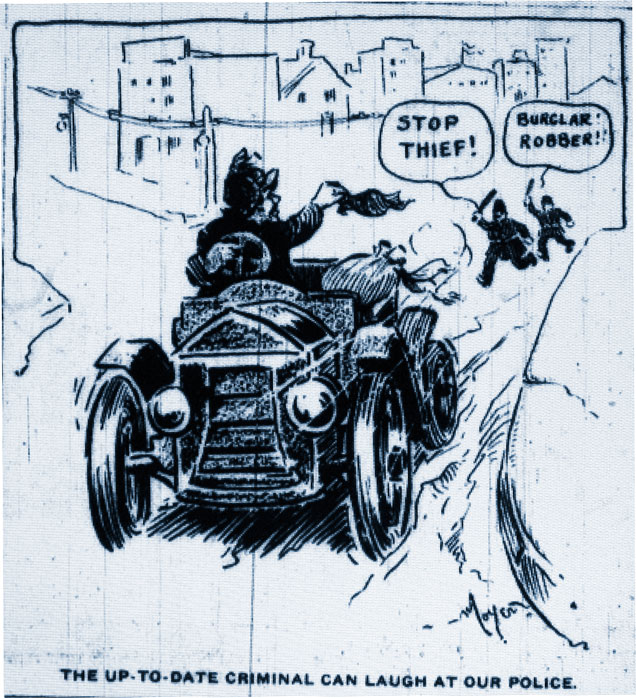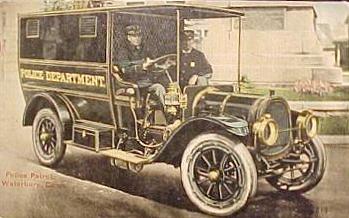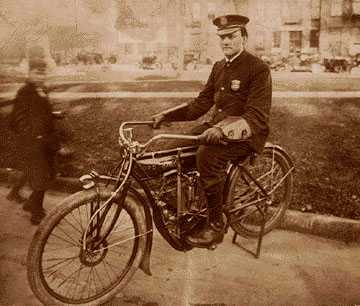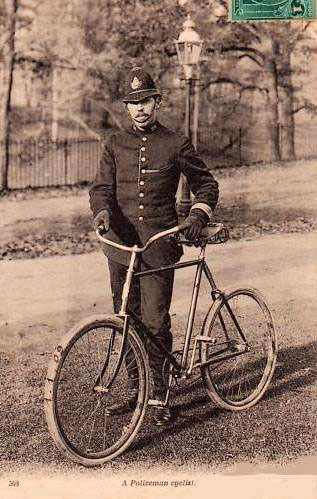In 1911, a time when there were roughly 3,000 automobiles in the entire city of Toronto, the public debated whether it was time for the Toronto police department to acquire its first automobile so as to be able to keep up with the criminal element. The Star Weekly’s subtitles argued that it was indeed time: “An automobile would be invaluable for capture of criminals and for going to assistance of officers attacked.”
From The Toronto Star Weekly, January 28, 1911
 Toronto has the best police protection of any city in the world. Statistics show that there are fewer serious crimes committed without the subsequent tracking down of the criminal than in any other city of its size, but this is entirely to the credit of the police themselves, and not to any particular help that they get from the city of the Government.
Toronto has the best police protection of any city in the world. Statistics show that there are fewer serious crimes committed without the subsequent tracking down of the criminal than in any other city of its size, but this is entirely to the credit of the police themselves, and not to any particular help that they get from the city of the Government.
Without any reward other than their regular pay, the Toronto detectives and policemen work hard and faithfully to give the city the reputation it bears for being a “good city,” as far as a large city can be good. Toronto is famous in the criminal world as being a place to be avoided, for, in spite of its proximity to the American border, American criminals find it no safe haven of refuge.
Yet, with all this record of crime prevention, Toronto has never done much in the way of reward. The Toronto police officers are very nearly the most poorly paid of their kind that can be found. They are not allowed to receive any reward for capturing a criminal. Even if the reward is offered by a foreign country, a Toronto police officer is not made any the richer by it.
Toronto is almost an exceptional city in this respect. A detective in an American city, very near here, made in one week the some of $350 in rewards for men he captured, yet with this incentive always before them it cannot be said that Buffalo has police protection that in any way compares with that of Toronto.
Unfit for Human Beings.
Number One Police Station has been indicted by a grand jury as being unfit for a human being; there are only two police stations in the city that are very much better. The Toronto jail is censured by every grand jury that goes near it, and has been for years. The detective headquarters at the City Hall are pitifully small for the size of the staff and for the amount of work that must be done there. The Inspector of Detectives has a small room that is practically filled by a desk and three chairs. There is a little ante room where a man on duty stays all day to answer questions in front of the inspector’s room; there are only two more rooms, not large ones, where the ordinary duties of the day are transacted. In these two rooms is the whole detective staff.
A room not so large as the average dining room, with a large table running down the middle of it, serves for 18 detectives when they are not out on cases, and into this room all arrests are brought before being taken to the police station. The City Hall is full of spacious corridors and lofty courtrooms that are, some of them, only used a few times during the year, yet there has not been provided room enough for the men who are responsible for the law and order of Toronto.
An Automobile Needed.
One of the most pressing needs of the detective corps is an automobile. Scoffers will remark, yes, it will be handy for joy riding or for relaxation after a hard day’s detecting, but it is on a par with some of the other archaic institutions that are foisted on a hard-working body of men that they are not provided with a motor car for emergency cases. There are innumerable cars with “City of Toronto” gaily painted on all sides and ends, but there is none for the police. If the aldermen want to go out and make a little inspection in their official capacity, they can go in a city motor. There are plenty of them, as can be seen by the parade at the City Hall side door, but if the detectives are needed somewhere in a hurry, they can walk or take a [street] car. Any old time will do when there is a criminal making his escape.
It is a proud boast of Torontonians in general that they have a large city than Detroit. They have. In Detroit, admittedly a smaller city, they have never spared any expense to make everything as easy as possible for the prevention of crime and the capture of criminals. They are not organized in any way to make their work superior to that of the Toronto men but they have every assistance from the city.
Motor cars are not particularly expensive. The Toronto police have not one, yet it is one of the everyday necessities of the work of policing a city. Hardly a day goes by that an automobile would not be more than useful. Emergencies are cropping up at any time of day or night, and when there is an emergency it has always been supposed that the police authorities should be on the job as soon as possible.
Lots of Time to Escape.
For instance, a man has walked into a shop in broad daylight and has stolen a trayful of diamonds. The frightened shopkeeper is kept quiet until the man has gone, probably at the point of a revolver; the man walks out of the shop and is gone. There remains for the man the one thing to be done in the situation is to call the police. Police [ . . . walking the beat would have to call headquarters from the telephone on the pole . . . ] and a criminal would have waited until the officer on the beat was at the other end of it. Main 222 is the police call, and after the shopman has telephoned, there is a long wait until a man can take a car up from headquarters, or until the man in uniform can be called at one of the police boxes.
During this time the criminal has had ample time to make what is technically termed a “getaway.” The trail is cold, and the detectives can do little except get a description and wait for the man to show himself. A chase would be futile, and unless the description tallied with that of someone they already knew, they would not know where to go and look for him. A motor car makes distances small and wastes no time. A police automobile would be ready at a moment’s notice for any kind of a trip.
The same thing would apply at night. A burglary has been committed and the man has walked away. Even supposing the scene of the burglary to be two miles from headquarters, a motor car could be there in less than four minutes. A doctor is not allowed to break the speed laws, but when he is on his way to emergency call, there is no fine. One judge even upholds their right to make the speed laws look like a boy’s of eleven and under Marathon.
Time is supposed to be money, but in this sense it certainly means greater efficiency. Criminals make a daily use of the automobile. The men who are set to catch them must walk or take a street car. The up-to-date criminal, and there are plenty of them, adopts every invention that will help him in his work; the Toronto police go ahead with conditions unchanged. The city could buy a high-powered car for $3,000 and run it for comparatively little.
Not long ago it was reported that a certain much-wanted man had gone into his house. He was an Italian, and consequently shielded by nearly all his compatriots, with the exception of an occasional personal enemy. Two detectives set out for the house at once, but when they arrived the bird had flown. Italians are notoriously hard to find, yet a motor car would have cut ten or fifteen minutes from the time of the report to the time when the detectives arrived. The man was wanted for stabbing a fellow countryman who was at the point of death. The capture of one such man would make the price of an automobile seem insignificant. it might be said that the man finally gave himself up, but that is an infrequent occurrence compared with the number of stabbings that occur.
In the case of a street brawl between foreigners, the detectives could be on the scene before either of the parties had had sufficient time to escape, sometimes possibly before any serious damage was done.
A striking illustration of the usefulness of a motor car is given in an occurrence at Detroit lately. A butcher in a fairly rough portion of the city, looking out of his shop window, saw a gang of toughs fighting with a policeman. His interference was the result of the fact that they got the policeman down, and were proceeding to “give the boots to him.” A policeman is generally a pretty rough proposition, but this one, although struggling frantically, was getting very much the worst of it.
The butcher ran to the back of the shop and telephoned the police, some two miles away. When they had heard the details and the address, the receiver was hung down at the other end rather sharply, and the butcher waited on a customer who was in the store. He was occupied for less than four minutes, he was sure of that, when he went back to the window, and saw the officers handcuffing the last of the thugs.
He went out on the street, surprised, and asked them where they had come from. They told him that some one had telephoned to headquarters about the fight, and that they had come at once. He asked if they knew who had done the telephoning, and they told him a name that proved to be his own.
“Why, I had hardly hung up the receiver,” he exclaimed, but it was nevertheless true. The car had been ready, and when the call for aid came in six officers bundled themselves in with the speed of firemen on their way to a general alarm, and had made the trip at a speed of nearly sixty miles an hour. The life of the policeman who had been attacked was probably saved by this haste, and the tough young men saved from electrocution. The latter would not have been considered particularly important, but the former was worth a lot.
Possibly such an emergency will never occur in Toronto, and possibly it will occur to-morrow. Unfortunately enough, the warning given before an emergency is considerably less than the legal week’s notice.
When a criminal is captured in Toronto you read about it in the papers; when one gets away, you do not. Toronto has a good record, but it would be pretty hard to guess how many burglars, thugs, and other greater and lesser fry of the underworld would be “doing their bit” if the Toronto detectives had a motor car when they really needed it. They have the power to hire one but transacting the necessary business would be nearly as great a waste of time as the trip on the street car. ♦









